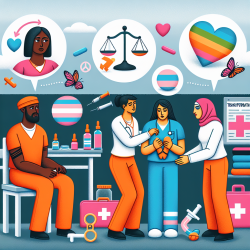Understanding Stigma in Substance Use Disorder: A Key to Better Therapy Outcomes
As a passionate advocate for improving therapy outcomes for children and individuals with diverse needs, it's crucial to leverage data-driven insights to enhance our practices. The research article "Relentless Stigma: A Qualitative Analysis of a Substance Use Recovery Needs Assessment" provides valuable insights into the barriers and supports for individuals recovering from substance use disorders (SUDs). This blog explores how understanding stigma can improve therapy outcomes and encourages practitioners to delve deeper into this critical area.
The Impact of Stigma on Recovery
Stigma is a significant barrier to recovery for individuals with SUDs. The study highlights how stigma manifests in various domains, including healthcare, community, and individual experiences. Stigmatizing attitudes can deter individuals from seeking treatment, impact their self-esteem, and hinder their recovery journey. As practitioners, recognizing and addressing these stigmas is essential to providing effective support.
Key Findings from the Research
The research identified several key themes related to stigma and recovery:
- Healthcare Stigma: Participants reported feeling judged and misunderstood by healthcare providers, which discouraged them from seeking necessary treatment.
- Community Stigma: The perception of individuals with SUDs as "criminals" or "junkies" exacerbates their isolation and reluctance to engage in recovery programs.
- Individual Stigma: Internalized stigma affects individuals' self-worth and motivation to pursue recovery.
Actionable Insights for Practitioners
Understanding these findings can guide practitioners in implementing strategies to combat stigma and support recovery:
- Educate Healthcare Providers: Training healthcare professionals to approach SUDs with empathy and understanding can reduce stigma and improve patient outcomes.
- Foster Community Support: Encouraging community education and involvement can create a more supportive environment for individuals in recovery.
- Promote Self-Empowerment: Helping individuals build resilience and self-esteem can counteract the effects of internalized stigma.
Encouraging Further Research
While the study provides valuable insights, further research is needed to explore the nuances of stigma and its impact on recovery. Practitioners are encouraged to engage in ongoing research and contribute to the development of evidence-based strategies to support individuals with SUDs.
Conclusion
Addressing stigma is a crucial step in enhancing therapy outcomes for individuals with SUDs. By understanding and mitigating the effects of stigma, practitioners can create more supportive environments that foster recovery and improve overall well-being. To read the original research paper, please follow this link: Relentless Stigma: A Qualitative Analysis of a Substance Use Recovery Needs Assessment.










